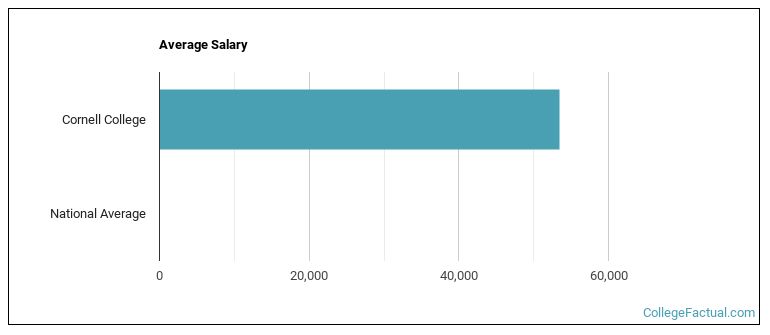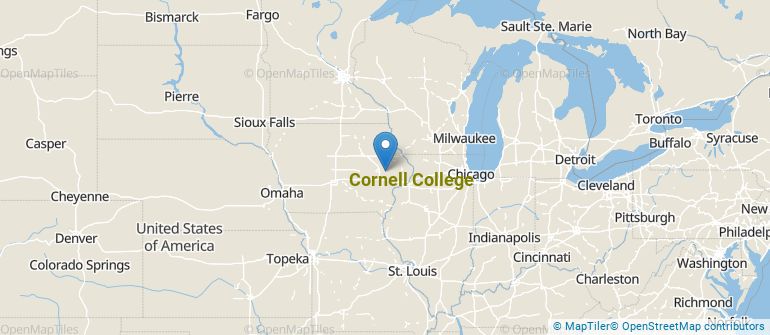 by our College Data Analytics Team
by our College Data Analytics TeamExplore the best ranked schools for the programs you are most interested in.
Cornell College was not ranked in College Factual's 2025 Best Overall Colleges report. This could be for a number of reasons, including lack of data.
When it comes to admittance, Cornell College is somewhat selective. Its acceptance rate is 79%, which means you'll face some strong competition during the admissions process. Do what you can to make your application stand out.
About 10% of students accepted to Cornell College submitted their SAT scores. When looking at the 25th through the 75th percentile, SAT Evidence-Based Reading and Writing scores ranged between 600 and 690. Math scores were between 570 and 690.
With a student to faculty ratio of 13 to 1, Cornell College is about average in this regard as the nationwide rate is 15 to 1. While this does not translate directly to class size, it's a good indicator of how much time professors will have to spend with their students on a one-on-one basis.
In addition to the student to faculty ratio, some people look at what percentage of faculty members are full-time as a sign of how much time professors will be able to spend with their students. This is because part-time teachers may not be be on campus as much as their full-time counterparts.
The full-time faculty percentage at Cornell College is 100%. This is higher than the national average of 47%.
Cornell College has a freshmen retention rate of 80%. That's a good sign that full-time students like the school and their professors enough to want to stick around for another year. It's also a sign that the admissions team did a good job in choosing applicants who were a good fit for the school.
Students are considered to have graduated on time if they finish their studies within four years. At Cornell College the on-time graduation rate of first-time, full-time students is 67%. That is great when compared to the national average of 33.3%
Find out more about the retention and graduation rates at Cornell College.
During the 2017-2018 academic year, there were 999 undergraduates at Cornell College with 993 being full-time and 6 being part-time.
| $0-30 K | $30K-48K | $48-75 | $75-110K | $110K + |
|---|---|---|---|---|
| $17,716 | $18,472 | $20,347 | $26,019 | $30,312 |
The net price is calculated by adding tuition, room, board and other costs and subtracting financial aid.Note that the net price is typically less than the published for a school. For more information on the sticker price of Cornell College, see our tuition and fees and room and board pages.
Almost 66% of college students who graduated with the class of 2018 took out student loans, but that percentage varies from school to school. At Cornell College, approximately 67% of students took out student loans averaging $8,230 a year. That adds up to $32,920 over four years for those students.

Get more details about the location of Cornell College.

Contact details for Cornell College are given below.
| Contact Details | |
|---|---|
| Address: | 600 First St. Sw, Mount Vernon, IA 52314-1098 |
| Phone: | 319-895-4000 |
| Website: | www.cornellcollege.edu/ |
| Most Popular Majors | Bachelor’s Degrees | Average Salary of Graduates |
|---|---|---|
| Health & Physical Education | 22 | $35,439 |
| Biochemistry, Biophysics & Molecular Biology | 20 | $39,164 |
| Teacher Education Grade Specific | 17 | $42,756 |
| General Engineering | 17 | NA |
| Computer Science | 16 | NA |
| Political Science & Government | 14 | NA |
| Fine & Studio Arts | 14 | NA |
| History | 13 | NA |
| General Psychology | 13 | NA |
| Management Sciences & Quantitative Methods | 10 | $42,127 |
Online learning options are becoming more and more popular at American colleges and universities. Online classes are great for students who have busy schedules or for those who just want to study on their own time.
In 2022-2023, 7 students took at least one online class at Cornell College. This is a decrease from the 107 students who took online classes the previous year.
| Year | Took at Least One Online Class | Took All Classes Online |
|---|---|---|
| 2022-2023 | 7 | 0 |
| 2021-2022 | 107 | 0 |
| 2020-2021 | 1,002 | 143 |
| 2018-2019 | 0 | 0 |
If you’re considering Cornell College, here are some more schools you may be interested in knowing more about.
Curious on how these schools stack up against Cornell College? Pit them head to head with College Combat, our free interactive tool that lets you compare college on the features that matter most to you!
Footnotes
*The racial-ethnic minorities count is calculated by taking the total number of students and subtracting white students, international students, and students whose race/ethnicity was unknown. This number is then divided by the total number of students at the school to obtain the racial-ethnic minorities percentage.
References
More about our data sources and methodologies.